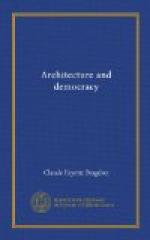Many of you will have had the advantage of a thorough technical training in your chosen profession: be grateful for it. Others, like Topsy, “just growed”—or have just failed to grow. For the solace of all such, without wishing to be understood to disparage architectural schooling, I would say that there is a kind of education which is worse than none, for by filling his mind with ready-made ideas it prevents a man from ever learning to think for himself; and there is another kind which teaches him to think, indeed, but according to some arbitrary method, so that his mind becomes a canal instead of a river, flowing in a predetermined and artificial channel, and unreplenished by the hidden springs of the spirit. The best education can do no more than to bring into manifestation that which is inherent; it does this by means of some stimulus from without—from books and masters—but the stimulus may equally come from within: each can develop his own mind, and in the following manner.
The alternation between a state of activity and a state of passivity, which is a law of our physical being, as it is a law of all nature, is characteristic of the action of the mind as well: observation and meditation are the two poles of thought. The tendency of modern life and of our active American temperament is towards a too exclusive functioning of the mind in its outgoing state, and this results in a great cleverness and a great shallowness. It is only in moments of quiet meditation that the great synthetic, fundamental truths reveal themselves. Observe ceaselessly, weigh, judge, criticize—this order of intellectual activity is important and valuable—but the mind must be steadied and strengthened by another and a different process. The power of attention, the ability to concentrate, is the measure of mental efficiency; and this power may be developed by a training exactly analogous to that by which a muscle is developed, for mind and muscle are alike the instruments of the Silent Thinker who sits behind. The mind an instrument of something higher than the mind: here is a truth so fertile that in the language of Oriental imagery, “If you were to tell this to a dry stick, branches would grow, and leaves sprout from it.”
There is nothing original in the method of mental development here indicated; it has been known and practised for centuries in the East, where life is less strenuous than it is with us. The method consists in silent meditation every day at stated periods, during which the attempt is made to hold the mind to the contemplation of a single image or idea, bringing the attention back whenever it wanders, killing each irrelevant thought as it arises, as one might kill a rat coming out of a hole. This turning of the mind back on itself is difficult, but I know of nothing that “pays” so well, and I have never found any one who conscientiously practised it who did not confirm this view. The point is, that if a man acquires the ability to concentrate




